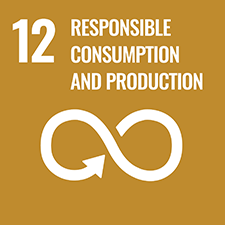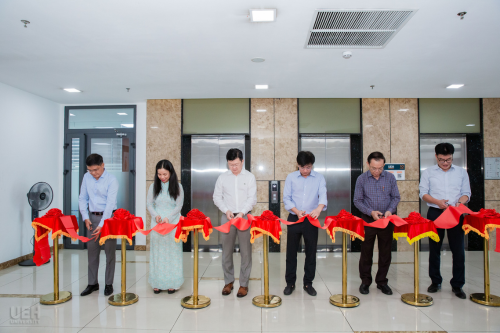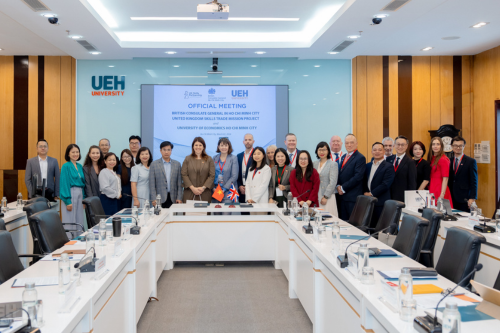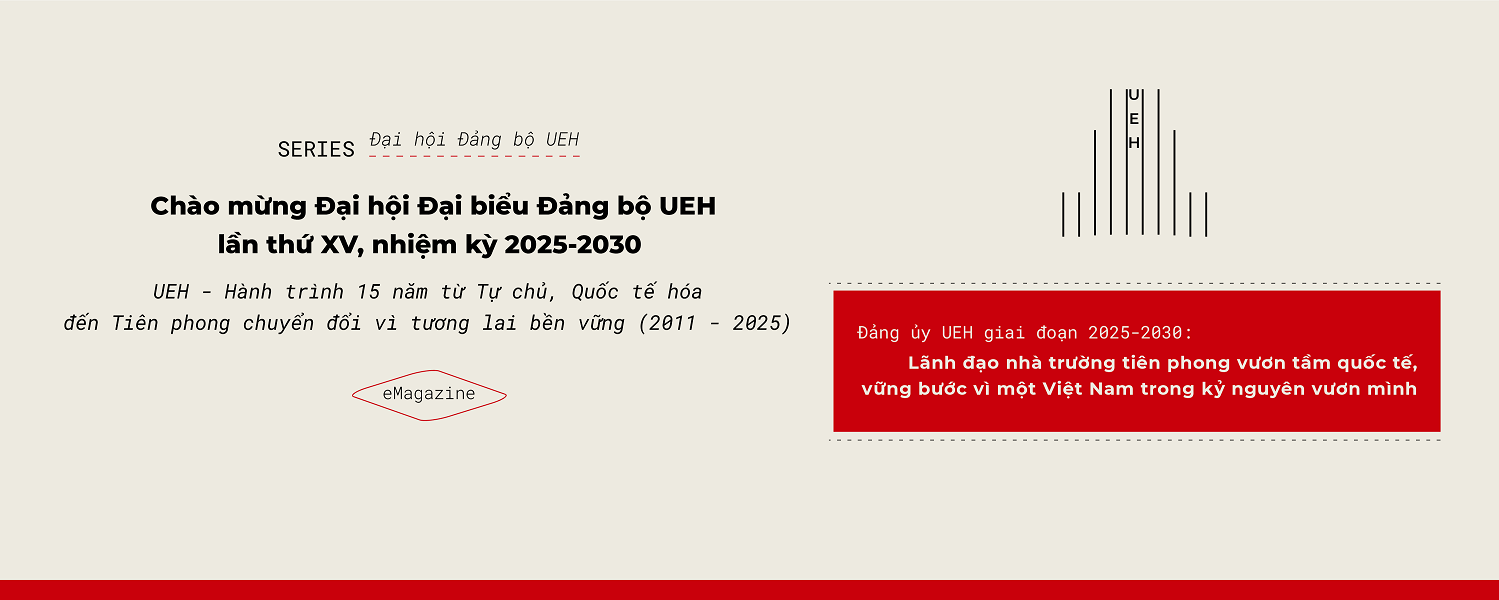
Welcome to the 15th UEH Party Congress, term 2025-2030: UEH’s Modern University Governance Strategy (2011–2025): Leading the University’s Pioneering Internationalization and Steadfast Progress Toward a Vietnam in the Rising Era
05 Jun, 2025
A Series of Activities Toward the 15th Congress of the Party Committee of University of Economics Ho Chi Minh City, Term 2025–203
UEH Party Executive Committee, Term 2025–2030: Leading the University’s Pioneering Internationalization and Steadfast Progress Toward a Vietnam in the Rising Era

In the face of a new era of national resurgence, the Party Executive Committee of the University of Economics Ho Chi Minh City (UEH) affirms its comprehensive leadership role and unwavering commitment to advancing UEH’s pioneering mission in higher education. With a strong sense of responsibility for national development, the Committee is determined to further UEH’s contributions to the country’s progress, proactively engage in international integration, and solidify its academic standing on both regional and global stages. This is the Party Organization’s overarching strategic objective and the guiding banner that the entire UEH community will rally around during the 2025–2030 term.
Our nation is undergoing a profound transformation, entering a new era of dynamic development, prosperity, and affluence under the wise leadership of the Communist Party of Vietnam. This is the era of building a strong, socialist Vietnam—where the people enjoy a life of wellbeing and happiness, are empowered to develop comprehensively, accumulate wealth legitimately, and contribute collectively to peace, stability, and progress in the region and the world, shaping the future of global civilization.
At the heart of this new era lies the realization of two historic national development milestones: by 2030, Vietnam aims to become a developing country with a modern industrial base and upper-middle income; and by 2045, to evolve into a fully developed, high-income nation—worthy of the thousand-year aspirations of its resilient and cultured people. This is a journey to awaken national pride, to strengthen autonomy, confidence, self-reliance, and resilience, and to harmonize endogenous strengths with global opportunities—enabling Vietnam to stand shoulder to shoulder with the world’s most advanced nations.
On the global stage, the era of deep internationalization and intensifying competition has placed an urgent demand on nations to enhance internal capacity and expand cooperation. In this context, higher education stands as a strategic pillar—a critical foundation for elevating national competitiveness. World-class universities are not only incubators of knowledge and skills but also powerful engines of economic growth, social progress, and national prestige. Universities must therefore actively integrate into the global education system, build strong academic reputations through research and teaching quality, and deliver learner-centered services with increasing professionalism, ethical standards, and humanistic values.
In this context, embracing the national directive that “education and training are the top national priorities,” as reaffirmed in the Politburo’s Conclusion No. 91-KL/TW (dated August 12, 2024) and Resolution No. 29-NQ/TW (dated November 4, 2013) of the Central Committee, the Party Executive Committee of the University of Economics Ho Chi Minh City (UEH) clearly affirms its pioneering role. It remains committed to exercising comprehensive leadership to elevate UEH to new heights - contributing significantly to making Vietnamese higher education regionally advanced in Asia by 2030 and globally competitive by 2045, aligning with developed educational systems around the world, and supporting the vision of a prosperous, civilized, and powerful Vietnam.
“The Party Executive Committee will lead UEH in contributing to the successful realization of this national directive.”
COMPREHENSIVE ACTION STRATEGY FOR THE 2025–2030 PERIOD
1. EDUCATING GLOBAL CITIZENS FOR SUSTAINABLE ACTION
2. RESEARCH FOR THE SUSTAINABLE DEVELOPMENT OF COMMUNITIES
3. GOVERNANCE ORIENTED TOWARD SUSTAINABLE ACTION
4. OPERATING FROM A CIRCULAR UNIVERSITY TO A GREEN UNIVERSITY
5. CONNECTING COMMUNITIES FOR SUSTAINABLE ACTION
6. BUILDING A STRONG AND COMPREHENSIVE PARTY ORGANIZATION
EDUCATING GLOBAL CITIZENS FOR SUSTAINABLE ACTION
In its educational strategy for the 2025–2030 period, UEH remains firmly committed to the goal of “Educating Global Citizens for Sustainable Action.” Accordingly, learners at UEH are not only equipped with advanced disciplinary knowledge but are also inspired to become global citizens who think critically, act responsibly, and uphold humanistic values. Education at UEH is oriented toward empowering students to make informed and ethical decisions that support environmental integrity, economic efficiency, and social equity—not only for the present generation but also for generations to come—in a spirit of respect for cultural diversity and universal human values.
To realize this mission, the UEH Party Executive Committee has identified three strategic priorities, accompanied by a comprehensive system of coordinated actions:
+ First, to enhance academic reputation and position UEH as a prestigious academic brand in the Asian region—a hub for global scholarly collaboration and intellectual exchange. Key implementation solutions include: (1) Advancing international partnerships with leading universities in the region; (2) Increasing UEH’s active participation and leadership in international academic forums; (3) Proactively integrating into the global higher education landscape; (4) Standardizing and managing scientific data systems; (5) Expanding and engaging international expert networks.
+ Second, to strengthen the capacity and development of the management team, faculty, and researchers, with a focus on attracting high-caliber lecturers and distinguished scholars from abroad. Key implementation solutions include: (1) Building a strong employer brand and talent management framework; (2) Promoting sustainable collaboration in training and research at both national and international levels; (3) Developing succession plans and training for future leaders and senior personnel; (4) Finalizing and scaling the implementation of the position-based staffing scheme tailored to UEH’s university governance model; (5) Improving working conditions and academic environments.
+ Third, to innovate, internationalize, and enhance the practical relevance of academic programs, through international accreditation, benchmarking, and mutual recognition with top universities in the region; as well as developing interdisciplinary and digitally oriented curricula. Key implementation solutions include: (1) Revamping curricula and course content to align with regional academic standards; (2) Undertaking international quality accreditation and recognition initiatives; (3) Designing multidisciplinary, interdisciplinary programs that integrate digital economy, digital content, or align with the Sustainable Development Goals (SDGs); (4) Strengthening practical and experiential components within programs; (5) Encouraging experiential teaching methods that offer unique and impactful learning experiences; (6) Expanding academic partnerships and student exchange programs with leading Asian universities; (7) Developing digital learning repositories and implementing a shared digital university model.
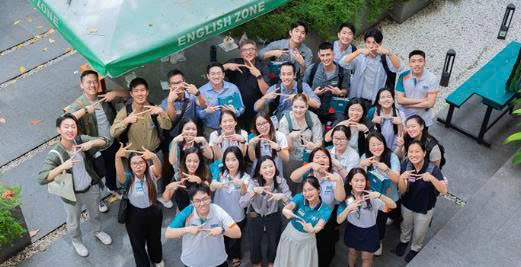
RESEARCH FOR THE SUSTAINABLE DEVELOPMENT OF COMMUNITIES
In the area of scientific research and technology transfer, UEH has set forth the strategic objective for the 2025–2030 period: “Research for the Sustainable Development of Communities.” UEH proactively promotes impactful, practice-oriented research aimed at addressing urgent and strategic societal issues—ranging from local to global levels—within the framework of sustainable development. Every research project and transfer initiative is envisioned not only as a product of academic excellence but also as a symbol of national service and a contribution to the country’s innovation and transformation agenda.
To realize this vision, UEH has identified the following key tasks and coordinated solutions:
+ First, to foster international collaboration and build a robust research ecosystem. Key implementation solutions include: (1) Developing a co-creative, multilateral research ecosystem; (2) Establishing and expanding the Green Researcher Community; (3) Building global academic partnerships and developing expert human resources in sustainability-related fields, including green economy, circular economy, digital economy, sharing economy, science, technology, and innovation; (4) Strengthening relationships with international and domestic organizations, conducting community-embedded local research, and fulfilling social responsibility commitments.
+ Second, to encourage international publications and elevate academic reputation. Key implementation solutions include: (1) Continuing to improve incentive mechanisms to sustain the volume and quality of high-impact international publications; (2) Guiding research themes, forming strong research groups, and encouraging faculties and institutes to publish internationally on topics aligned with the Sustainable Development Goals (SDGs); (3) Providing full institutional support to foster the growth of the Journal of Asian Business and Economic Studies (JABES); (4) Investing further in comprehensive databases and digital infrastructure to support scientific research.

GOVERNANCE ORIENTED TOWARD SUSTAINABLE ACTION
In terms of institutional governance, UEH remains steadfast in building a modern, transparent, and effective university governance model—where every individual and unit is inspired to act toward a sustainable future. Every governance decision is designed to maximize internal strengths, foster comprehensive development, and elevate UEH’s international standing.
To realize this vision, UEH has identified six key tasks accompanied by comprehensive implementation strategies:
+ First, to modernize infrastructure and facilities, expanding UEH’s physical presence to meet international and regional standards. Key implementation solutions include: (1) Upgrading and expanding Campus A into a smart university hub and an international education gateway in Ho Chi Minh City; (2) Continuing the implementation and completion of approved development items at the UEH South Saigon campus to establish a green, carbon-neutral university site, including the development of a University Park that connects with surrounding communities; (3) Investing in the construction of a UEH branch campus in Nha Trang City, Khanh Hoa Province; (4) Investing in the second UEH campus in Long Ho District, Vinh Long Province.
+ Second, to enhance governance capacity through digital transformation and technological advancement. Key implementation solutions include: (1) Upgrading digital infrastructure to support smarter, more sustainable campus operations; (2) Digitizing the learner experience across UEH, increasing satisfaction with the academic and work environment; (3) Advancing digital governance to support communication and dissemination of research outcomes, fostering scientific collaboration and international engagement; expanding the UEHer network and strengthening alumni and partner experiences.
+ Third, to strengthen institutional branding and strategic communication capacity. Key implementation solutions include: (1) Sustaining and expanding UEH’s brand communication strategies; (2) Developing advanced communication technologies to enhance outreach and engagement.
+ Fourth, to maintain and improve UEH’s standing in international university rankings.
+ Fifth, to promote innovation and entrepreneurship. Key implementation solutions include: (1) Enhancing activities related to innovation and entrepreneurship education, training, and mentoring; (2) Strengthening and expanding UEH’s entrepreneurship support network; (3) Investing in modern facilities to create favorable environments for innovation and start-up initiatives.
+ Sixth, to develop a sustainable financial strategy. Key implementation solutions include: (1) Designing plans to diversify revenue streams; (2) Increasing income from training programs, research, consulting services, technology transfer, and entrepreneurship in alignment with the university model; (3) Strengthening partnerships with enterprises and attracting corporate investment in research and development activities; (4) Effectively mobilizing alumni resources to support long-term university development.

OPERATING FROM A CIRCULAR UNIVERSITY TO A GREEN UNIVERSITY
“Operating from a Circular University to a Green University” is a key orientation within UEH’s Multidisciplinary University Strategy and its enduring commitment to sustainable development. The university pioneers the creation of a campus model grounded in circular economy principles—optimizing resources, reducing emissions, and fostering an environmentally conscious mindset among every member of the UEH community.
The following strategic tasks and solutions have been identified:
+ First, to continue the implementation and completion of the Living Lab UEH Green Campus project, particularly the Circular Campus phase. Key implementation solutions include: (1) Focusing on the execution of key components such as sustainable procurement policies, Net Zero commitment, energy efficiency policies, on-site renewable energy use, and a clear roadmap to achieve Net Zero targets; (2) Standardizing, scaling, and promoting the project and its successful green initiatives across the wider community.
+ Second, to cultivate a cohesive and inspiring university organizational culture. Key implementation solutions include: Reviewing and developing the UEH cultural model that is inspirational, value-driven, and capable of amplifying and institutionalizing UEH’s identity throughout the community.
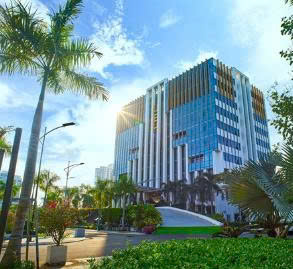
CONNECTING COMMUNITIES FOR SUSTAINABLE ACTION
In fulfilling its mission of community engagement, UEH continuously expands its role as a sustainable university—one that cultivates community-driven initiatives and partners with local governments, businesses, and citizens on the journey toward sustainable development. By creating inclusive, multilateral spaces for stakeholder engagement, UEH promotes interdisciplinary, intergenerational, and interregional sustainable actions that contribute to shaping a civilized, equitable, and progressive society.
The following key tasks and implementation strategies have been identified:
+ First, to develop a strategic plan for enhancing UEH’s visibility and engagement within the international community, in alignment with the UEH Global Hub initiative.
+ Second, to build a sustainable, co-creative partnership platform with enterprises and professional associations. Key implementation solutions include: (1) Launching the program Community Connection – Knowledge Sharing – Sustainable Action; (2) Identifying strategic partners from multinational corporations, business groups, and professional associations; facilitating networks among large corporations, SMEs, and startups through the UEH Innovation Incubator; (3) Increasing private sponsorship through dedicated Research Investment Funds focused on key global and local challenges such as climate change, renewable energy, clean technology, and sustainable agriculture (e.g., the Green Researcher Community).
+ Third, to establish UEH as a City University Hub in Ho Chi Minh City, Vĩnh Long, and Nha Trang through partnerships with local authorities. Key implementation solutions include: (1) Developing formal cooperation plans with local governments through joint research projects, policy consultation, and technology transfer initiatives; (2) Structuring engagement frameworks for enterprises and other stakeholders through sustainable knowledge-sharing programs.
+ Fourth, to strengthen the knowledge transfer roles of UEH’s institutes, centers, and member campuses. Key implementation solutions include: (1) Orienting the development of each UEH-affiliated institute and center based on its unique strengths, enabling them to become leading units in research, consultancy, and technology transfer, particularly on issues of global and national concern; (2) Offering free training workshops and sustainability-focused learning channels for the public, provided by institutes and centers under UEH and its campuses.
BUILDING A STRONG AND COMPREHENSIVE PARTY ORGANIZATION
Building a Strong and Comprehensive Party Organization has always been regarded as the fundamental foundation and guiding compass for all activities at UEH. The UEH Party Organization consistently strengthens its political will, enhances leadership capacity, and reinforces the fighting strength of its Party units at all levels - shaping a unified, intellectual, disciplined, and pioneering collective at the forefront of innovation.
Key tasks and solutions have been identified as follows:
- Political and ideological education: Enhancing leadership capacity and reinforcing the Party’s strength across the organization by improving the quality and delivery of political education activities, including seminars and workshops to disseminate Party resolutions, directives, and State policies. Promoting the exemplary role of Party leaders within the UEH political system in cultivating revolutionary ethics and professional responsibility. Strengthening the study and practice of Ho Chi Minh’s thought, morality, and lifestyle in close alignment with UEH’s institutional culture. Raising awareness throughout the Party on defending the ideological foundation of the Party and effectively countering hostile narratives and internal manifestations of “self-evolution” and “self-transformation.”
- Party organizational development: Innovating leadership approaches and improving the quality of the leadership cadre. Developing training plans to enhance management skills, strategic thinking, and technological adaptability among Party officials. Streamlining Party structures, enhancing the quality of Party membership, and ensuring the Party's unified leadership in personnel management according to decentralization principles. Continuing to reform leadership thinking within the Party Executive Committee and linking institutional performance with the practice of thrift and the active prevention of bureaucracy, corruption, and waste.
- Party membership development: Promoting the development of new Party members with a strong emphasis on quality. Establishing annual targets and plans focusing on the admission of outstanding young lecturers and students. Strengthening the identification and cultivation of qualified candidates, following official standards, processes, and procedures. Integrating Party development with the planning of UEH’s future leadership teams to ensure political integrity, ethical commitment, and professional excellence.
- Inspection and supervision: Strengthening the Party’s inspection and supervision functions to ensure compliance with regulations and discipline, enhancing transparency and accountability across all levels. Raising awareness among Party members about the significance of inspection and discipline in Party building. Regularly disseminating directives, conclusions, and guidelines related to Party oversight and discipline.
- Building institutional governance: Reviewing and reorganizing administrative structures toward efficiency and strategic alignment with UEH’s development goals. Strengthening the role of the University Council and ensuring close coordination with the Executive Board under the centralized leadership of the Party Executive Committee.
- Mass mobilization, democratic governance, and leadership of socio-political organizations: Enhancing communication and timely engagement with Party members, staff, and students. Disseminating development policies and institutional directions through official channels. Continuing to implement regular dialogue mechanisms to ensure transparency and responsiveness to feedback. Enabling socio-political organizations to exercise their advisory and supervisory roles. Promoting solidarity and shared responsibility by enhancing collaboration with political-social organizations such as the Trade Union, Veterans’ Association, Youth Union, and Student Association—working collectively toward the shared goals of the university.
As a leading national university, with a strong sense of responsibility to the Party, the State, and the People, the Party Executive Committee of the University of Economics Ho Chi Minh City affirms its commitment to leading the entire university political system with unity, proactivity, and innovation—relentlessly striving to realize the Party’s major strategic directions for education, science and technology, and university transformation in the new era. Every Party member, staff member, and student at UEH shall serve as a key driver in nurturing a spirit of service, contributing together to the building of a multidisciplinary, sustainable, and internationally recognized UEH.
“The UEH Party Executive Committee calls upon all Party members, staff, and students to uphold solidarity, enhance their sense of responsibility, and embrace a strong aspiration for contribution. Let every UEHer unite and strive to successfully implement the UEH Development Strategy for 2025–2030, with the vision of becoming a multidisciplinary, cross-sectoral, and sustainability-driven university, ranking among the Top 200 to Top 100 universities in Asia.”





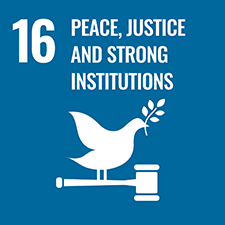
![[Research Contribution] Modernizing and Elevating Vietnamese Higher Education: Creating Breakthroughs in High-Caliber Human Resource Development and Talent Cultivation, Leading Research and Innovation](/images/upload/thumbnail/ueh-thumbnail-639083193174001549.png)
![[Research Contribution] Sustainable Manufacturing: A Driving Force for the Green Economy and the Challenges Ahead](/images/upload/thumbnail/ueh-thumbnail-639082294182922007.png)
